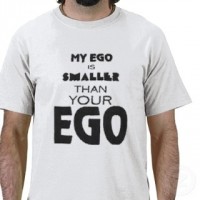Taming the fat, relentless ego…

“In the moral life the enemy is the fat relentless ego.” By this, Iris Murdock means that self-absorption is a high risk condition—its all-consuming nature makes it the enemy of virtue.
Self-absorption taints our perception of goodness so that we do not recognize that kindness, gentleness, and empathy enrich our lives. It also diminishes our desire for goodness. We are less moved to be kind, gentle, and empathetic than we are to indulge our own concerns. If, then, virtues, including the fruits of the Spirit mentioned by Paul in Galatians 5:22-23, are to get a foothold in us, we must tame the wild, expansive ego.
This quote, from philosopher Clifford Williams, is part of a discussion of how thinking and learning can contribute to our “training in goodness.” His suggestions follow the apostle Paul’s instructions to Timothy, “Train yourself in godliness” (1 Tim. 4:7). Here’s a list of his main points.
· Those who play together must consider the expectations of the others if the activity is to turn out well.
· Encountering the suffering of another also helps us to be less self-absorbed. We recognize that someone else has intense feelings and may need help or attention.
· When we listen, we set aside our own concerns for a time so that we can pay attention to the concerns of someone else. We try to understand those concerns, without letting our own interests intrude. We may, of course, offer our thoughts, but this is conversation, not listening. Real listening involves checking self-absorption and focusing on the other.
· Listening in the intellectual context is the same. When we read, study, or listen to a talk, our aim is genuinely to understand the other person’s ideas. To do so, we must temporarily suspend our own ideas and attempt to see the other’s perspective. If the ego intrudes, no real understanding takes place.
· Think … of discussing and debating. These require a demanding observance of the Golden Rule: “In everything do to others as you would have them do to you” (Matt. 7:12). When we explain our ideas, whether in friendly discussion or highly charged debate, we want those with whom we are interacting to focus on our central points and not peripheral ones. … If someone were to react only to a peripheral point, we would feel that our ideas had not been treated fairly. We also want our ideas to be taken seriously. … When we respond to others’ ideas … we should try to ferret out what is essential in them and respond with considered reasoning. The ego, in contrast, would just as soon go for cheap victories, trampling others’ views. …
· Think … of looking for magnificence and tragedy. In order to respond with awe to physical magnificence, we must attend to the complexity, intricacy, and grandness of what we observe. If it is moral magnificence to which we are responding, the splendor of virtuous action or character, we must attend to the moral grandness that is present. And if it is tragedy we are confronting, we must focus on the distress involved. In each case, our attention is focused on something other than ourselves. Our egos must let go of some of their self-directed engrossment.
These suggestions for “training in goodness” look very much like good manners and simple acts of courtesy. They are everyday opportunities for taming the “wild, expansive ego” so that the fruits of the Spirit can “get a foothold in us.” They are also the everyday out-workings of God’s grace—that grace which absolves us from “our resistance to goodness.” And growing in his grace motivates us to pursue goodness and to become certain kinds of people—or more precisely, certain kinds of neighbors.
Dr. Clifford Williams’ reflections on self-absorption are in “The Effects of Thinking,” chapter 5 of The Life of the Mind: A Christian Perspective. Dr. Williams has taught philosophy at Trinity International University since 1982. He is the author of books on a variety of subjects: Free Will and Determinism: A Dialogue (1980), One More Train to Ride: The Underground World of Modern American Hoboes (2003), The Divided Soul: A Kierkegaardian Exploration (2009).


 September 7, 2012
September 7, 2012 







Comments are closed.